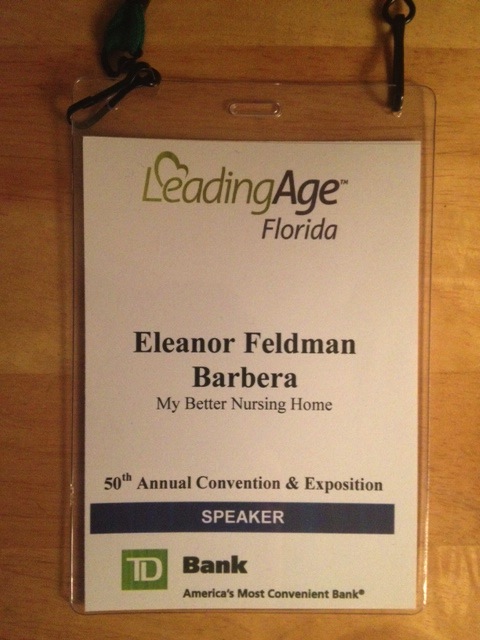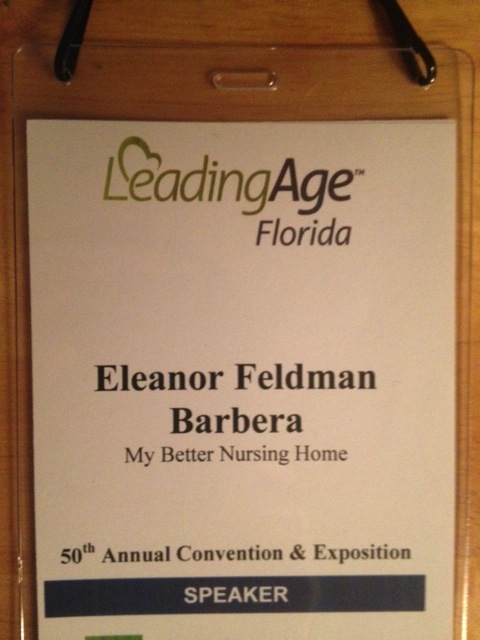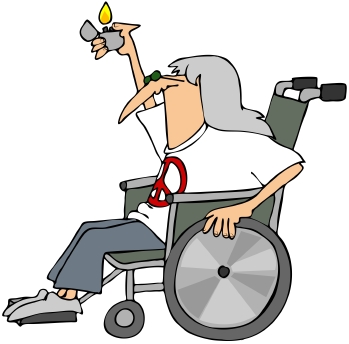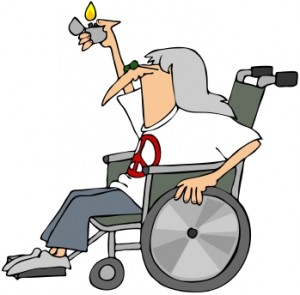Category: Boomers
Posted by Dr. El - August 27, 2019 - Boomers, Depression/Mental illness/Substance Abuse, McKnight's Long-Term Care News, Resident care, Younger residents

As I discussed in Severely mentally ill residents: A ‘perfect storm’ creates a SNF wave, long-term care has a growing population of severely mentally ill (SMI) residents, with the number of residents diagnosed with schizophrenia or bipolar disorder approaching 20% in some states as of 2017.1
In addition, 46.3% of LTC residents were diagnosed with depression in 2015 and 2016.2 Some were undoubtedly individuals with severe, chronic depression.
People with SMI generally enter nursing facilities for rehabilitation following a fall or some other health crisis. Discharge choices can be limited due to coexisting medical and mental health problems, leading them to become long-term residents despite their relatively young age (an average age of 62 versus 77 in the general nursing home population3).
A review of research on individuals with mental health problems, Physical illness in patients with severe mental disorders, finds that people with SMI have a greater likelihood of physical illness than those without SMI. The authors of the study note that “important individual lifestyle choices, side effects of psychotropic treatment and disparities in health care access, utilization and provision…contribute to these poor physical health outcomes.”
Their research suggests multiple points at which long-term care providers can intervene to assist SMI residents.
Medical assessment
Nurses and physicians can be taught to recognize health problems typical of the SMI population so that they’ll be alert to the increased risk of illnesses such as diabetes, metabolic syndrome, obesity-related cancers, cardiovascular diseases, osteoporosis, hepatitis B/C, tuberculosis, impaired lung function, poor dental status and other concerns.
Staff members who are comfortable physically assessing older residents might need additional training to be at ease evaluating SMI individuals, who may be more physically imposing because of their relative youth, come across as unfamiliar or frightening in their presentation or be themselves uncomfortable with medical tests or interventions.
For the entire article, visit:
Posted by Dr. El - July 26, 2013 - Boomers, Business Strategies, Customer service, McKnight's Long-Term Care News

Here’s my latest article at McKnight’s Long-Term Care News:

“You do so much for seniors,” my friends tell me, having heard too many stories about the horrors of nursing homes. “Those places need more people like you.”
“Actually,” I respond, “there are lots of people like me out there trying to do the right thing for our elders.”
Nowhere was this more apparent than at the 50th annual LeadingAge Florida convention this month, where I was speaking about the psychosocial needs of baby boomers. I was surrounded by people who, like me, were all jazzed up about long-term care and excited about the possibilities for improving services.
My talk about the needs of baby boomers generated an exciting exchange of ideas, with members of the audience sharing innovative best practices with each other. Among the best practices mentioned:
- To address boomers’ need and expectation of being socially connected while in a long-term care setting, many of the Florida facilities have WiFi and use the Internet to help families stay connected. Skype and other video chat services are available for care plan meetings as well.
- Individual preferences for music were met at one site through an iPod program that offered an iPod for each interested resident, complete with “their” music chosen from the thousands of songs in the home’s music library.
- Lending credence to my assertion that a strong resident council is the driving force of a good home, one CCRC reported that the dynamic and thriving resident council of their independent living facility generates innovative suggestions that the administration follows to make successful improvements. For tips on how to rejuvenate a lackluster resident council, start here for the first in a 3-part blog series designed to create effective meetings that energize your community.
For the entire article, visit:
For more on boomer needs, read
Posted by Dr. El - July 17, 2013 - Boomers, Business Strategies, Customer service, Talks/Radio shows, Younger residents


I’m honored to be speaking at LeadingAge Florida’s 50th annual convention this year. I’ll be talking tomorrow morning about the anticipated psychosocial needs of baby boomers. If you’re at the convention, please come by to hear me and be sure to say hello afterward. Hope to see you there!
Posted by Dr. El - June 28, 2013 - Books/media of note, Boomers, Business Strategies, McKnight's Long-Term Care News, Resident care, Younger residents

Here’s my latest article at McKnight’s Long-Term Care News:

Young adults in long-term care: a new resource for caregivers
According to a 2010 NPR report, young adults have been one of the fastest growing long-term care populations over the past 10 years, with 14% of nursing home residents under the age of 65. Some live in facilities that have specialized in the care of younger residents and others are in settings where almost all the other residents are seniors.
Both scenarios pose challenges in terms of accommodating the unique physical, emotional, and recreational needs of younger adults — and the reactions of staff members to their young charges.
Having spoken with many young residents and their bewildered staffers over the years, I know firsthand how challenging interactions can be. I wrote about some of the psychological issues and remedies in my 2008 McKnight’s guest column, Young adults in long-term care: the canaries in the coal mine, where I argued that the problems arising with young adults now are precursors to those that will be endemic when the assertive baby boomers arrive at our doors — unless we adapt as providers.
Younger adult toolkit
Recognizing the need for facilities to be better prepared, the American Medical Directors Association has released a toolkit on “The Younger Adult in the Long Term Care Setting” as part of its LTC Information Series. I had the pleasure of working on this project, which covers a wide range of matters affecting young adults and provides recommendations for addressing them.
The guide is one of the few sources of information on this understudied population. If your facility has even one young or boomer resident that staff members consider “demanding” or “a problem,” you’ll find this report invaluable.
For the rest of the article, visit:

Posted by Dr. El - June 14, 2013 - Boomers, Business Strategies, Communication, Customer service, Engaging with families, McKnight's Long-Term Care News

Here’s my latest article at McKnight’s Long-Term Care News:

5 lessons long-term care providers can learn from Joan Lunden
Award-winning journalist and author Joan Lunden and I met recently to talk about eldercare issues. Joan’s mother is 94 years old and happy in a small care home after living for years in the community with home care.
Joan, a physician’s daughter, talks with family caregivers around the country as part of her mission to educate people about the challenges of eldercare.
The observations she shared in our conversation deserve attention from LTC providers looking to meet the needs of residents and their families. As a spokeswoman for family caregivers, her experience echoes that of millions of families across the country.
1. Help people choose the right level of care for their loved one.
The small care home was the third placement for Joan’s mother once she could no longer live in the community.
Lunden: When I finally moved my mother into a facility, I moved her into a place that would have been great for my mother 10 years ago. I moved the mother that was in my head. In reality, the beautiful dining room scared her because she didn’t recognize people, she was alone in her apartment when she started sundowning. The place terrified her. I had chosen the completely wrong facility.
As LTC providers, who recognize the toll it takes on elders and their family members to move from facility to facility, we can do more to help families find a placement that meets the needs of their loved one.
- We can strive to provide the family with a realistic assessment of needs and what a facility can offer.
- We can refer residents to other levels of care within our systems.
- We can build relationships with other facilities so that we refer potential residents to each other.
2. Assist families with the transition to parenting their parent
Joan points out that shifting the roles in the family can be very challenging.
Lunden: When you get to that life transition when you become the parent to your parent, it doesn’t feel natural because you’ve spent a lifetime learning to be a child to them and they have always been in that parental position. To all of a sudden have that role reversed is very disconcerting to a lot of people. It’s a hard one to accept. It often feels uncomfortable to tell your parent what they can do or can’t do.
Some families come to us having negotiated the shift in roles for years, but more often we find adult children and their loved ones struggling to find a way to handle dramatic role changes in the midst of a health crisis.
We can assist families with the role transition when we:
- Offer family education groups.
- Refer to counseling resources in the community.
- Recommend written resources such as David Solie’s book, “How to Say It to Seniors” which focuses on the communication challenges between adult children and their aging parents.
- Use our consulting psychologists to help the team with challenging family issues.

3. Provide an opportunity for staff to take a break
Joan offers a place for caregivers to recharge through her Camp Reveille.
Posted by Dr. El - June 5, 2013 - Anecdotes, Boomers, Communication, Engaging with families, For Fun

Award-winning journalist and author Joan Lunden takes time from her busy schedule to talk with Dr. El of My Better Nursing Home about her experiences caring for her 94-year old mother and speaking with other family caregivers around the country.

Dr. El: Joan, you’re part of what’s called “The Sandwich Generation,” taking care of your young children and an aging parent while maintaining a high-profile career. How do you manage this?
JL: After working on Good Morning America for twenty years where you never know what part of the world you’re going to be in while raising 3 daughters, I don’t think anything could get any harder than that. But I think having kids the second time around, you have to decide what you’re like and are you physically and psychologically up to the task. I wasn’t even daunted about having a second round of children. But no matter what we do as women, running businesses and keeping hectic schedules, the day you start taking care of a parent, that can really bring you to your knees….When you get to that life transition when you become the parent to your parent, it doesn’t feel natural because you’ve spent a lifetime learning to be a child to them and they have always been in that parental position. All of the sudden to have that role reversed is very disconcerting to a lot of people. It’s a hard one to accept. It often feels uncomfortable to tell your parent what they can do or can’t do.
Dr. El: The caretaking you’re talking about can be quite stressful and I saw on your website you have a place called Camp Reveille. Can you tell me about that?
JL: I got remarried and I married a guy who runs summer camps for children. I’m no dummy, I married a guy with a 50-foot climbing wall and 17 tennis courts! I started spending my summers up in Maine with him and at the end of every summer I would find that I was my least stressed, my absolute most fit, I was one with nature again….One day we were walking by the lake and I said to my husband, “I’m always talking to these women’s groups all over the nation. I should have a summer camp for women.” And my husband said, “The facility is yours. Do it.” And the next summer we ran our first Camp Reveille, which is a 3-night, 4-day stay because women don’t have wives and can only deal with being away for that amount of time. That’s long enough to unhook from electronics, unwind from the hectic pace of life…and connect with the women….The emotional strength that comes from getting a group of 150 women together is really powerful. The sharing of stories, the understanding that you’re going to get to the other side [of what you’re going through], learning from each other, motivating each other in a safe environment. They go back not just refreshed, but I feel a lot of them experience a transformation and are able to let go of a lot of baggage they didn’t even know they were carrying around.
Dr. El: Is the camp mostly for family caregivers or is it also for professional caregivers?
JL: It’s for women in general. About 75% of the women identified themselves [in their pre-camp questionnaires] as caregivers. Several women had just lost their husbands and came to the camp with their hospice workers. I never have seen such a transformation as these two women [a widow and her hospice worker] who came in and when they left on the last day I almost didn’t recognize them because they had let go of so much stress and heartache that they were like two giddy little girls, laughing.
Dr. El: For most families, one of the stresses of eldercare involves the financial challenges, including medication costs. What are your thoughts on how to manage this?
JL: I do a lot of health campaigns and I’m a doctor’s kid who always thought I’d grow up to be a doctor until I worked in a hospital and found out that scalpels were not happening in my career. But truly the dissemination of health information and the ability to help people make better decisions is at my core. I’m working right now with Walgreens who has really made great strides in trying to figure out ways to bring prescription costs down. One of the ways is Medicare Part D. The real area that it seems people can get some savings is that a lot of these programs that you have to sign up in when you sign up for Medicare Part D are now affiliating themselves with pharmaceutical chains. When they do that, you need to review your plan and ask if there is a preferred pharmacy network so you can get the lowest copays.
Dr. El: This is an important issue because sometimes people will skip their medication because they can’t afford it and this leads to a whole host of problems and readmissions to the hospital and nursing home.
JL: That’s what this Walgreens survey found, that one in five people were skipping doses to make a prescription last longer or not getting them refilled. And one in four said that when a doctor wrote a prescription for them, they never got it filled. Nonadherence to medication therapy is estimated to cost the healthcare system 300 billion dollars a year…. I don’t know how we’re going to reform healthcare in this country unless we do it grassroots, person by person, just like we got people to stop smoking. It’s a huge educational process to help seniors and caregivers understand how they can get the most cost savings from these plans that they belong to.

Dr. El: Let’s talk a little bit about your personal situation. Your mother is in a care facility right now. Can you tell me about how you chose that place and what it’s like there?
JL: I had kept my mom and my brother in a condo together and had a person come in to help them. My brother had Type II Diabetes and he had all the complications one could have with it and he was unable to keep a job for several decades, so I paid for them. The condo worked pretty well until my brother died about 6 or 7 years ago and it became abundantly clear to me that there was no way my mother at 88 years old could continue to live in that condo by herself. And that is one of the toughest things, when I talk to people, making that decision that their parents need to move out of their house or apartment and into a care facility. And I think that part of the reason is that we’re living with this myth that the minute you leave your house and move into a nursing home, you die, and that’s absolutely not the way it works, at least from what I’ve seen.
Dr. El: I work in nursing homes and it’s not what I’ve seen either.
JL: When you leave a place, hopefully you make that decision before it’s a crisis, but most people wait until somebody’s had a fall or has an accident in the car or wait for the crisis call. Once you move your loved one into a facility, I’ve found they’re often better off instead of being by themselves in their house. I think if I’d have gotten my mother into senior living far sooner, she would have been much better off today because she would have had conversations with people. She became a recluse at home. When I finally moved my mother into a facility, I moved her into a place that would have been great for my mother ten years ago. I moved the mother that was in my head. In reality, the beautiful dining room scared her because she didn’t recognize people, she was alone in her apartment when she started sundowning….The place terrified her. I had chosen the completely wrong facility.
Dr. El: And how would you know because you’d never done this before.
JL: And not only that, I hadn’t been living with her. I was typical of many families in that I lived far away and when people come into town for a visit, everyone puts on their best face — there’s no problem, we’re doing fine. And you don’t realize that they haven’t opened the mail for the last two years. In retrospect, there were warning signs that my mother needed more help. I came back to Sacramento, California and moved her to the next place, but she kept falling. Her neurologist recommended a small care facility in a house setting with five residents. That was the best advice I ever got. She now lives in a ranch-style house that’s not at all institutional. She gets out of her room every day, they play bingo — she’s the reigning champ, she reads the newspaper to the other residents in their 90s and they do chair exercises. It’s fastidiously clean. It was the best move I ever made.
Dr. El: It’s so amazing when you find the right place because it changes your relationship from the worried, intense caregiving to I’m visiting my mom and we’re having a relationship like we used to have.
JL: Yes. Instead of spending the entire time in town figuring out what’s wrong, now I can go in — and my mom can have good days and bad days, she does have dementia — but I made up these books with photographs and she can sit and reconnect. The man who runs the place gave me the advice that the more you can engage with the older person in the life they knew, rather than trying to engage them in your life, the more comfortable they are and the better they begin to have a discussion with you. When I talk about what life was like when I was a little girl, my mother opens up like a flower.
Dr. El: You’re talking about flipping the roles of family members, and one of the chapters of my book, The Savvy Resident’s Guide, is for elders to help them see that they still have a role in parenting by helping their children adjust to the fact that they’re aging and dealing with end of life issues. Are there ways that your mom is still in the mom role with you?
JL: Not in any significant way other than that I still want her to like the way I dress, I dress for her when I go there. She still wants to feel the pride of a momma. They don’t want to know you won a certain award particularly, they want to know you’re happy. I’m in the child role in that I’m still trying to make sure that my momma is proud.
Dr. El: You speak with family caregivers all over the country. Is there anything you’d like to say to professional caregivers on behalf of the families?
JL: Thank you, thank you, thank you, thank you! I take my hat off to those people who work as caregivers. It is a testament to their compassion and their patience. I can go to sleep at night because I know the heart of these women who are taking care of my mom all day long… I thank God that we have those people in our society that are willing to dedicate themselves truly to someone else’s minute-by-minute happiness.
Posted by Dr. El - December 22, 2011 - Boomers, Business Strategies, Customer service, Long-Term Living Magazine

Check out my article on the 10 anticipated psychosocial needs of baby boomers, now a web feature on Long-Term Living Magazine online.
10 anticipated psychosocial needs of baby boomers
Consider these changes as LTC adapts to the next generation
by Eleanor Feldman Barbera, PhD
We’ve heard the rumblings of the coming generation in the voices of our “young” residents in their 50s and 60s. It’s the younger residents who most often chafe at the restrictions of nursing home life, such as being unable to leave the facility unsupervised, or being cautioned to sit when they’d prefer to walk and take the risk of falling. As the baby boomers enter long-term care in greater numbers, those rumblings will grow louder, necessitating changes in how we deliver care. We’ll be more successful in making these changes if we anticipate the needs of the boomers, rather than merely reacting to their dissatisfaction.
Attending to their psychosocial needs will help your boomers find comfort, enjoyment and purpose in their later years, thereby creating vital, thriving organizations better able to adapt to changes in the long-term care landscape. Here’s what to look out for, and what you can do to help your organization and your residents.
1. Social connectedness
Internet access keeps boomer residents in touch with their social networks as well as the rest of the world. The next generation of residents will expect to be wired, so make your long-term care facility a hotspot now. To increase the value of this service, add adaptive equipment, along with training in how to use it, lockable laptop drawers, additional electrical outlets and policies on maintaining privacy in the nursing home.
2. Social differentiation
Say good-bye to “Goodnight, Irene” and hello to “You Can’t Always Get What You Want”, “Are You Lonesome Tonight?” and “Soldier Boy”. The universal music of earlier generations shifted toward more individualized preferences in our new cohort, so plan on mixing your Motown with your Hendrix nights. Our boomers also had exposure to a wide variety of ethnic foods during their lifetimes. Consider polling residents to discover their preferences and offering an international option on your menu for greater variety and the opportunity for personal growth.
To read more: 10 anticipated psychosocial needs of baby boomers.
Posted by Dr. El - February 9, 2011 - Boomers, Business Strategies, Customer service, Technology, Tips for gifts, visits
I recently read an article about how the aging of baby boomers is causing some technology companies to focus on products geared toward older adults, often with the goal of helping them remain independent and at home for longer periods of time. But what about those older adults already living in nursing homes? What would help them be more independent?
Here are products I thought residents would appreciate, and ones I’d like myself when it’s my turn. Please add your suggestions in the Comments section:
- A motorized wheelchair
- A remote control for the air conditioner/heating system
- Windows that can open and shut by remote control
- A rubberized telephone that can withstand frequent dropping
- Wi-Fi
- Any adaptive equipment I need to use my laptop
- A staff paging system that doesn’t involve overhead announcements
Posted by Dr. El - December 15, 2010 - Boomers, Depression/Mental illness/Substance Abuse, Resident education/Support groups, Technology, Younger residents
The saying in 12-Step programs such as Alcoholics Anonymous (AA) is that alcoholism is a three-fold disease: physical, mental, and spiritual. The only-half-kidding joke is that alcoholism is a three-fold disease: Thanksgiving, Christmas, and New Year’s. The holidays can be a particularly stressful time for nursing home residents as their celebrations have often changed significantly from those in the past. The loss of family members, the inability to get around independently, and the lack of opportunity and funds to shop for gifts can take their toll on residents who may have had trouble with the holidays even before they entered the nursing home.
In case you haven’t been persuaded by my previous arguments for holding AA meetings in nursing homes (or in case you’ve been persuaded but your administration hasn’t) there are also telephone meetings available to residents for the cost of a phone call. Callers can listen in, or share their story if they wish, in an anonymous environment. Below are links to the telephone meeting lists of several 12-Step programs.
Alcoholics Anonymous
Al-Anon (for family and friends of alcoholics)
Overeaters Anonymous
Nicotine Anonymous
Posted by Dr. El - November 29, 2010 - Boomers, Business Strategies, Communication, Customer service, Engaging with families, Technology, Younger residents

Looking for a great, inexpensive way to create some good will and holiday cheer at the nursing home this year? Why not set up a call center using Skype? Residents, families, and staff members can sign up to call loved ones around the globe, conversing with them via video call.
What it would take:
- A laptop or desk-top computer set up with FREE Skype
- A semi-quiet, semi-private area for conversations
- Tech support, or volunteers who know how to use Skype (for example. high school students or tech-savvy residents)
- A pre-call information sheet for families so they can set up Skype on the computers of those they plan to call.
- A sign-up sheet to maintain order in what is likely to be a wildly popular service














